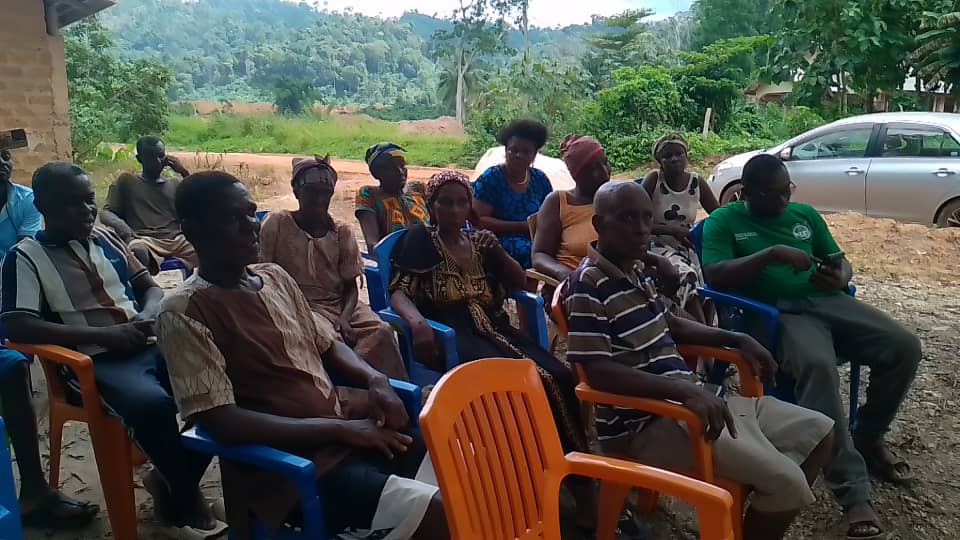
In an effort to promote environmental conservation and community empowerment, the Rights of Nature Ghana Movement (RONAG), with support from Gower Street, U.K., organised a comprehensive tree planting exercise and rights of nature sensitisation workshop for the residents of the Atatem community in the Adansi North District of the Ashanti Region.
The event, held on Friday, June 20, 2025, in commemoration of World Environmental Day, lasted approximately seven hours and drew enthusiastic participation from local teachers, students, and community members.
Educational Engagement at the School Level
The day started with an engaging session at Atatem D/A Primary and Junior High School, where teachers and students were introduced to the concept of the Rights of Nature—an emerging framework emphasising the intrinsic rights of ecosystems to exist, flourish, and regenerate. With the threat of Galamsey (illegal mining) encroaching on their school land and surrounding forests, participants learned how safeguarding the environment through legal and community-driven approaches could help preserve vital water bodies, forests, and lands.
RoNAG supplied native tree seedlings, generously provided by the Forestry Commission of Ghana, as part of the nationwide greening initiative to mark the observance of World Environmental Day. Students actively participated in planting the seedlings, symbolizing their commitment to restoring degraded areas and strengthening ecological resilience. RoNAG also emphasized the crucial roles of trees and forests in maintaining ecological balance, supporting biodiversity, and counteracting the harsh impacts of illegal mining activities.
Community Dialogue on Sustainable Livelihoods
Beyond the school grounds, the workshop extended into a heartfelt dialogue with Atatem residents about alternative livelihood options that could reduce their dependence on the forests and river systems threatened by Galamsey and other destructive environmental activities. The community boasts rich natural attractions, including rare White-necked Picathartes birds, stunning waterfalls, and the Gyimi River, home of rare West African slender-snouted crocodile species. This could be developed into an ecotourism site to generate employment avenues for members in the Atatem and neighbouring communities such as Bofoyeduro. Participants expressed deep concern over the ecological devastation caused by illegal mining, which has led to land degradation, water pollution, and health complications.
In response, RoNAG proposed developing a “Rights of Nature Bill” for the Gyeme River and surrounding forests—an innovative legal framework aimed at empowering local communities to protect their natural resources. The community members strongly supported this initiative, recognizing that such legal protections could serve as a barrier against illegal miners’ encroachment and facilitate sustainable environmental management.
A Collective Call for Action
Community members voiced their fears over losing land and natural resources, often due to decisions made by local chiefs and authorities without consultation. Many lamented that their voices had been marginalized in land and resource management, leading to ecological and health crises. RoNAG assured the community of its continued commitment to supporting their fight against environmental destruction, emphasizing the importance of collective action and legal advocacy.
Looking Ahead
The event underscored the vital role of community participation in environmental conservation and the need for innovative legal tools like the Rights of Nature Bill. As the skies cleared and the sun dipped below the horizon, participants left with renewed hope and a shared determination to protect Atatem’s natural heritage. RoNAG’s initiative in Atatem is part of a broader national effort to combat illegal mining and foster sustainable development through community empowerment, legal reforms, and environmental education. RoNAG is currently undertaking a socio-legal research funded by Gower Street in the U.K. with support from Eco Jurisprudence Monitor, United States, and Lawyers for Nature, U.K., aimed at identifying opportunities for the reception of the rights of nature as a sustainable solution to the ecological atrocities to nature in the country particularly caused by illegal mining known as galamsey, deforestation, illegal fishing practices, open-air waste disposal, and others.
The research is titled ‘Assessing Legal Frameworks and Stakeholder Perspectives on Integrating the Rights of Nature into Ghana’s Environmental Governance’. Five key research objectives drive the research: 1. To analyse the existing environmental legal instruments and regulatory frameworks in Ghana in the context of the rights of nature; 2. To analyze influential rights of nature legal initiatives globally and their lessons for Ghana; 3. To assess the level of awareness and understanding of the rights of nature among stakeholders; 4. To identify opportunities and challenges for integrating the rights of nature into Ghana’s environmental governance and 5. To propose legal and policy measures for effective incorporation of the rights of nature within Ghana’s environmental laws. The conduct of the research started in May 2025 and it is hoped to be completed by December 2025.
It is led by RoNAG’s Director and Lead Campaigner, Dr. Dickson Adom, an indigenous knowledge and environmental expert. Other members of the research team are Mr. Richard Obeng Mensah, an environmental law expert, Dr. David Azanu, an environmental analyst, Dr. Michael Essuman, a Sustainability and Content Pedagogy expert, Dr. Stella Afi Makafui Yegblemenawo, an eco-linguistic expert, Mr. Benjamin Ossom, a wildlife and nature resource management expert, and Mr. Prince Anane Agyei, a protected area management expert.
RoNAG will share the research findings with key stakeholders for environmental governance in an academia-media workshop in late December 2025. Also, RoNAG will engage communities in mining-prone areas on practical ways of implementing the recommendations from the study to end the humiliation of river bodies, land, forests, and other natural elements in these regions. The movement pledged to remain a steadfast ally to the Atatem community for defending the foundational rights of nature as they strive to reclaim and safeguard their land, rivers, and forests for generations to come.

